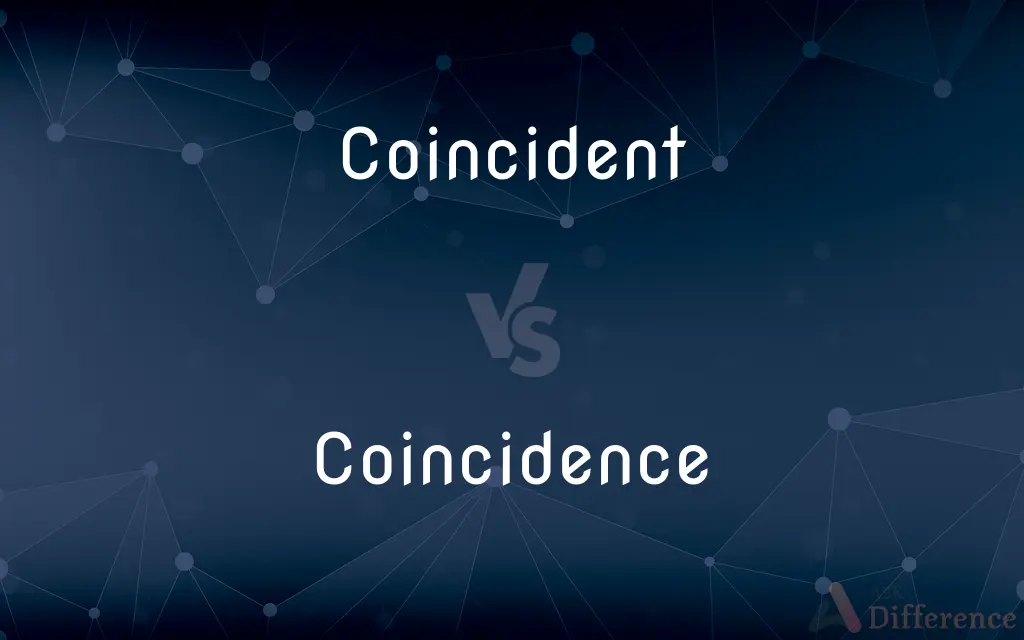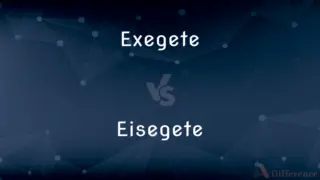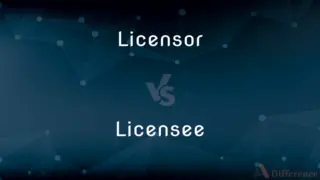Coincident vs. Coincidence — What's the Difference?
By Tayyaba Rehman — Updated on August 21, 2023
Coincident refers to two or more things occurring at the same time or place, while coincidence refers to such an occurrence, especially when it seems accidental or unexpected.

Difference Between Coincident and Coincidence
Table of Contents
ADVERTISEMENT
Key Differences
Coincident, as an adjective, pertains to two or more things occurring simultaneously or being in the same place. When you say that events are coincident, you're noting their simultaneous or overlapping nature. On the other hand, coincidence, as a noun, speaks about the occurrence itself. It encapsulates the instance when two or more events happen at the same time, often unexpectedly or without any apparent connection.
Coincident can also hint at alignment or overlap in various scenarios. For instance, when two lines on a graph are coincident, they lie on top of one another. Coincidence, in its essence, often carries with it a hint of surprise or astonishment. It's the unexpected nature of the occurrence that makes us exclaim, "What a coincidence!"
Both words, coincident and coincidence, share a common root in the Latin word "coincidere," which means "to agree, to coincide." While coincident has a more factual or neutral tone, indicating events that simply happen at the same time, coincidence can sometimes suggest a meaningful or fateful alignment of events, even if no real connection exists.
In daily language, when two friends unexpectedly run into each other in a foreign country, they might describe their meeting as a "coincidence." This expresses the unplanned and surprising nature of their encounter. However, if you were to describe their location at that exact moment, you could say their positions were "coincident."
Comparison Chart
Part of Speech
Adjective
Noun
ADVERTISEMENT
Definition
Happening at the same time or place
An occurrence of events at the same time
Contextual Nuance
More factual or neutral
Often implies unexpected alignment
Usage in Geometry
Two lines or shapes that overlap
N/A
Common Association
Alignment, overlap
Surprise, fate
Compare with Definitions
Coincident
Occurring together in space or time.
Their birthdays were coincident.
Coincidence
The occurrence of two or more events at the same time, usually by chance.
Meeting him at the concert was a pure coincidence.
Coincident
Occurring together in space or time
The fall in the stock market was coincident with the slowdown in economic activity
Coincidence
A surprising concurrence of events, perceived as meaningfully related.
The coincidence of the two leaders' speeches was uncanny.
Coincident
Corresponding in nature, character, or function.
His interests were coincident with hers.
Coincidence
An instance of two things happening at the same time.
The coincidence of rain and our picnic was unfortunate.
Coincident
Occupying the same position or area.
The two circles were coincident.
Coincidence
An event resulting from chance.
That both siblings got engaged on the same day was a happy coincidence.
Coincident
Relating to events or incidents that happen at the same time.
The end of the film was coincident with the theater's closing.
Coincidence
A situation in which separate things happen by chance at the same time or in the same way.
The twins wore the same dress to the party, but it was just a coincidence.
Coincident
5 Being in agreement or harmony with something.
Her views were coincident with the team's.
Coincidence
A coincidence is a remarkable concurrence of events or circumstances that have no apparent causal connection with one another. The perception of remarkable coincidences may lead to supernatural, occult, or paranormal claims.
Coincident
Having coincidence; occupying the same place; contemporaneous; concurrent; - followed by with.
Christianity teaches nothing but what is perfectly suitable to, and coincident with, the ruling principles of a virtuous and well-inclined man.
Coincidence
The fact of corresponding in nature or in time of occurrence
The coincidence of interest between the mining companies and certain politicians
Coincident
Occurring or operating at the same time;
A series of coincident events
Coincidence
(analysis) A coincidence point.
Coincident
In agreement or harmony
The stake of defence attorneys is not always coincident with that of their clients
Coincidence
A remarkable concurrence of events or circumstances without apparent causal connection
They met by coincidence
It was a coincidence that she was wearing a jersey like Laura's
Coincident
Occupying the same area in space or happening at the same time
A series of coincident events.
Coincidence
(geometry) A fixed point of a correspondence; a point of a variety corresponding to itself under a correspondence.
Coincident
Being in agreement or harmony
Testimony that was coincident with the actual facts.
Coincidence
The condition of occupying the same place in space; as, the coincidence of circles, surfaces, etc.
Coincident
Matching point for point; coinciding
Coincident circles.
Coincidence
The presence of ionizing particles or other objects in two or more detectors simultaneously, or of two or more signals simultaneously in a circuit.
Coincident
(of two events) Occurring at the same time.
Coincidence
The state or fact of occupying the same relative position or area in space.
Coincident
(of two objects) Being in the same location.
Coincidence
A sequence of events that although accidental seems to have been planned or arranged.
Coincident
Being in accordance, matching.
Coincidence
Of objects, the property of being coincident; occurring at the same time or place.
Coincident
Either of multiple simultaneous related incidents
Coincidence
Of events, the appearance of a meaningful connection when there is none.
That the two writers were born and died on the same day is just a coincidence, although there are many conspiracy theories about it.
Coincident
One of two or more coincident events; a coincidence.
Coincidence
The condition or fact of happening at the same time; as, the coincidence of the deaths of John Adams and Thomas Jefferson.
Coincident
Matching point for point;
Coincident circles
Coincidence
Exact correspondence in nature, character, result, circumstances, etc.; concurrence; agreement.
The very concurrence and coincidence of so many evidences . . . carries a great weight.
Those who discourse . . . of the nature of truth . . . affirm a perfect coincidence between truth and goodness.
Coincidence
An event that might have been arranged although it was really accidental
Coincidence
The quality of occupying the same position or area in space;
He waited for the coincidence of the target and the cross hairs
Coincidence
The temporal property of two things happening at the same time;
The interval determining the coincidence gate is adjustable
Common Curiosities
What is the noun form of coincident?
The noun form related to coincident is "coincidence."
How does coincident relate to timing?
Coincident indicates events that happen at the same time, implying a synchronous occurrence.
How do you use coincidence in a sentence?
One example is: "Running into my high school teacher in Paris was a strange coincidence."
What is a coincidence?
Coincidence is the occurrence of two or more events at the same time, especially when this is unexpected or seems unplanned.
Is a coincidence always unplanned?
Not necessarily, but the term often carries an implication of unexpected or unplanned alignment of events.
What does coincident mean?
Coincident refers to two or more things occurring simultaneously or being in the same place.
Is coincident a noun or adjective?
Coincident is an adjective.
Can you use coincident in geometry?
Yes, in geometry, two lines or shapes that overlap or lie on top of each other are described as coincident.
Can coincidences have deeper meanings?
Some people believe in synchronicity or meaningful coincidences, while others view them as purely random events.
Are coincident and coincidence interchangeable?
No, they are not. "Coincident" is an adjective describing simultaneous occurrences, while "coincidence" is a noun referring to the instance of such occurrences.
Share Your Discovery

Previous Comparison
Exegete vs. Eisegete
Next Comparison
Licensor vs. LicenseeAuthor Spotlight
Written by
Tayyaba RehmanTayyaba Rehman is a distinguished writer, currently serving as a primary contributor to askdifference.com. As a researcher in semantics and etymology, Tayyaba's passion for the complexity of languages and their distinctions has found a perfect home on the platform. Tayyaba delves into the intricacies of language, distinguishing between commonly confused words and phrases, thereby providing clarity for readers worldwide.
















































